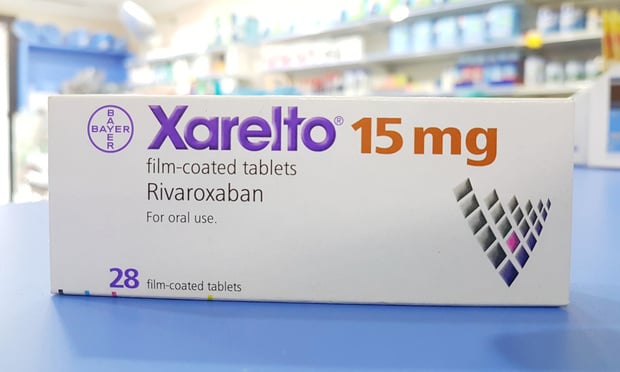Xarelto Makers Created 'False Narrative' in Phila. Trial, Plaintiff Claims
Attorneys for plaintiff Daniel Russell filed a post-trial motion earlier this week in Russell v. Janssen Pharmaceuticals, asking the court to grant a new trial in the case, which ended with a defense win on April 27.
May 09, 2018 at 02:24 PM
4 minute read
 Photo: Shutterstock.com
Photo: Shutterstock.com After failing to secure a win last month, the plaintiff in the latest Xarelto trial has asked that the defense verdict be vacated, arguing that several court rulings allowed Bayer and Janssen Pharmaceuticals to create a “false narrative” for the jury.
Attorneys for plaintiff Daniel Russell filed a post-trial motion earlier this week in Russell v. Janssen Pharmaceuticals, asking the court to grant a new trial in the case, which ended with a defense win on April 27. The post-trial filing was docketed with the court Tuesday.
Russell, who had sued the companies after he suffered a severe bleed after being prescribed to take 20 milligrams of the blood thinner along with aspirin and Plavix, contended that the jury should have been allowed to hear evidence that the drugmakers allegedly determined taking 20 milligrams of Xarelto with aspirin and Plavix was too dangerous to ethically study.
Along with decisions limiting the testimony of some witnesses, barring the plaintiffs from introducing that evidence helped the defendants to present a “false narrative” to the jury, Russell said in the motion, which plaintiffs' liaison counsel in the Xarelto litigation, Michael Weinkowitz of Levin, Sedran & Berman, filed.
“The jury was kept from the important fact that directly contradicted this narrative—that the defendants and their consultant had concluded that it was unethical to test the 20 mg dose of Xarelto in that combination in the Pioneer study,” the 66-page motion said. ”Adding insult to injury, the court's jury instructions provided no guidance on how to properly assess the defendants' duty to adequately warn.”
In an emailed statement, a spokesman for Bayer said there is no reason to have a new trial.
“The plaintiff was given wide latitude by the court in Russell to prove his case and he failed to do so,” spokesman Christopher Loder said. “There is no basis for a new trial.”
Janssen spokeswoman Sarah Freeman also said in an emailed statement, ”We have full confidence in the jury's verdict, which was supported by the evidence.”
Russell was the second Xarelto case to be tried in Philadelphia state court, and the first to focus on the defendants' alleged failure to warn about the dangers of taking Xarelto when patients are also treating with aspirin and Plavix, which is called dual anti-platelet therapy. About 25 percent of the more than 1,500 Xarelto cases pending in Philadelphia's mass tort program involve plaintiffs who took Xarelto while also treating with aspirin and Plavix.
The Russell case was tried several months after another Philadelphia jury awarded nearly $28 million to a woman who suffered a severe bleed while taking Xarelto along with aspirin. That award, however, was later reversed by Philadelphia Court of Common Pleas Judge Michael Erdos, who is also presiding over the Russell case. Three other Xarelto cases have been tried in federal court. Those cases all resulted in defense verdicts.
Russell, a New Jersey resident, had been treating with dual anti-platelet therapy because he suffered acute coronary syndrome, which had previously required him to have a stent installed. In 2013, he was prescribed Xarelto to address a separate condition stemming from an irregular heartbeat, known as atrial fibrillation, which can often lead to stroke.
The defendants contended at trial that, due to his various medical issues, Russell was a high-risk patient, but his prescribing doctors knew the risks associated with Xarelto before making the decision to put him on the medication.
Russell's post-trial motion focused on a response to peer review questions regarding the companies' safety study that, Russell contended, indicated that the drugmakers chose not to study the effects of a 20 milligram dose of Xarelto together with aspirin and Plavix because of the health concerns.
Russell contended that the excluded document was not hearsay, and, although it was written after he suffered his bleed, it showed the company knew the risks of the 20 milligram dose before he had been prescribed the medication. Russell further argued that, without that evidence, the defendants were able to tell the jury during closing arguments that “the whole world” felt the 20 milligram dose was safe, despite Russell's argument that the safety hadn't been studied with regard to patients also taking Plavix and aspirin.
“During his closing, defendants's counsel repetitively noted that Penn Medicine, the FDA and the American Heart Association all 'agreed' that Xarelto 20 mg in combination with Plavix and Aspirin was appropriate,” the motion said. “As the court made no effort to provide a curative instruction as requested, the perniciousness of these falsehoods was permitted to invade the jury box.”
The next Xarelto trial is set to being next month.
Weinkowitz declined to comment beyond the filing.
This content has been archived. It is available through our partners, LexisNexis® and Bloomberg Law.
To view this content, please continue to their sites.
Not a Lexis Subscriber?
Subscribe Now
Not a Bloomberg Law Subscriber?
Subscribe Now
NOT FOR REPRINT
© 2025 ALM Global, LLC, All Rights Reserved. Request academic re-use from www.copyright.com. All other uses, submit a request to [email protected]. For more information visit Asset & Logo Licensing.
You Might Like
View All
Plaintiff Argues Jury's $22M Punitive Damages Finding Undermines J&J's Talc Trial Win
4 minute read
Pa. High Court: Concrete Proof Not Needed to Weigh Grounds for Preliminary Injunction Order
4 minute read
Superior Court Directs Western Pa. Judge to Recuse From Case Over Business Ties to Defendant
3 minute read
Pa. Superior Court: Sorority's Interview Notes Not Shielded From Discovery in Lawsuit Over Student's Death
3 minute readTrending Stories
Who Got The Work
J. Brugh Lower of Gibbons has entered an appearance for industrial equipment supplier Devco Corporation in a pending trademark infringement lawsuit. The suit, accusing the defendant of selling knock-off Graco products, was filed Dec. 18 in New Jersey District Court by Rivkin Radler on behalf of Graco Inc. and Graco Minnesota. The case, assigned to U.S. District Judge Zahid N. Quraishi, is 3:24-cv-11294, Graco Inc. et al v. Devco Corporation.
Who Got The Work
Rebecca Maller-Stein and Kent A. Yalowitz of Arnold & Porter Kaye Scholer have entered their appearances for Hanaco Venture Capital and its executives, Lior Prosor and David Frankel, in a pending securities lawsuit. The action, filed on Dec. 24 in New York Southern District Court by Zell, Aron & Co. on behalf of Goldeneye Advisors, accuses the defendants of negligently and fraudulently managing the plaintiff's $1 million investment. The case, assigned to U.S. District Judge Vernon S. Broderick, is 1:24-cv-09918, Goldeneye Advisors, LLC v. Hanaco Venture Capital, Ltd. et al.
Who Got The Work
Attorneys from A&O Shearman has stepped in as defense counsel for Toronto-Dominion Bank and other defendants in a pending securities class action. The suit, filed Dec. 11 in New York Southern District Court by Bleichmar Fonti & Auld, accuses the defendants of concealing the bank's 'pervasive' deficiencies in regards to its compliance with the Bank Secrecy Act and the quality of its anti-money laundering controls. The case, assigned to U.S. District Judge Arun Subramanian, is 1:24-cv-09445, Gonzalez v. The Toronto-Dominion Bank et al.
Who Got The Work
Crown Castle International, a Pennsylvania company providing shared communications infrastructure, has turned to Luke D. Wolf of Gordon Rees Scully Mansukhani to fend off a pending breach-of-contract lawsuit. The court action, filed Nov. 25 in Michigan Eastern District Court by Hooper Hathaway PC on behalf of The Town Residences LLC, accuses Crown Castle of failing to transfer approximately $30,000 in utility payments from T-Mobile in breach of a roof-top lease and assignment agreement. The case, assigned to U.S. District Judge Susan K. Declercq, is 2:24-cv-13131, The Town Residences LLC v. T-Mobile US, Inc. et al.
Who Got The Work
Wilfred P. Coronato and Daniel M. Schwartz of McCarter & English have stepped in as defense counsel to Electrolux Home Products Inc. in a pending product liability lawsuit. The court action, filed Nov. 26 in New York Eastern District Court by Poulos Lopiccolo PC and Nagel Rice LLP on behalf of David Stern, alleges that the defendant's refrigerators’ drawers and shelving repeatedly break and fall apart within months after purchase. The case, assigned to U.S. District Judge Joan M. Azrack, is 2:24-cv-08204, Stern v. Electrolux Home Products, Inc.
Featured Firms
Law Offices of Gary Martin Hays & Associates, P.C.
(470) 294-1674
Law Offices of Mark E. Salomone
(857) 444-6468
Smith & Hassler
(713) 739-1250





